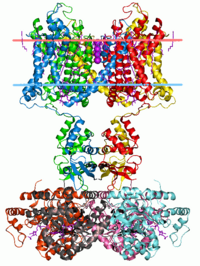
Photo from wikipedia
The congenital short QT syndrome (SQTS) is a rare condition characterized by abbreviated rate-corrected QT (QTc) intervals on the electrocardiogram and by increased susceptibility to both atrial and ventricular arrhythmias… Click to show full abstract
The congenital short QT syndrome (SQTS) is a rare condition characterized by abbreviated rate-corrected QT (QTc) intervals on the electrocardiogram and by increased susceptibility to both atrial and ventricular arrhythmias and sudden death. Although mutations to multiple genes have been implicated in the SQTS, evidence of causality is particularly strong for the first three (SQT1−3) variants: these result from gain-of-function mutations in genes that encode K+ channel subunits responsible, respectively, for the IKr, IKs and IK1 cardiac potassium currents. This article reviews evidence for the impact of SQT1-3 missense potassium channel gene mutations on the electrophysiological properties of IKr, IKs and IK1 and of the links between these changes and arrhythmia susceptibility. Data from experimental and simulation studies and future directions for research in this field are considered. This article is part of the theme issue ‘The heartbeat: its molecular basis and physiological mechanisms’.
Journal Title: Philosophical Transactions of the Royal Society B: Biological Sciences
Year Published: 2023
Link to full text (if available)
Share on Social Media: Sign Up to like & get
recommendations!